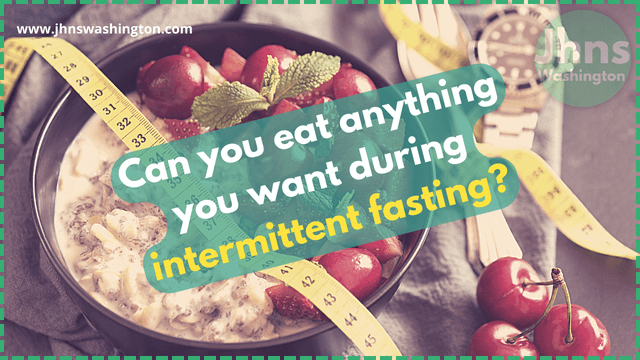What can you have during fasting after intermittent fasting

With intermittent fasting, it depends on when you eat food and at what hours of the day you completely abstain from it. At first, it sounds as if what exactly you eat is also secondary. But is that even true? Two experts explain what is important.
There are many different methods for intermittent fasting (IF): With the 16:8 method, for example, you fast for 16 hours a day, while you are only allowed to eat for 8 hours.
Those who stick to the 5:2 method, on the other hand, fast two full days a week - and eat normally the rest of the time.
Anyone who restricts the times they eat can quickly be tempted to really eat during the permitted hour's junk food, chocolate and snacks included.
But is that even allowed?
Composition of the diet not specified
It's true that intermittent fasting in itself gives you the freedom to eat whatever you want.
Since you usually only eat one or two larger meals a day with this diet, you can theoretically eat even more calories than usual per meal.
That's logical: If you eat three to five times a day regularly, you have fewer calories for each meal than an interval faster.
- "Technically, there are no dietary restrictions with intermittent fasting,"
- "It's a diet based on the timing of eating - not the composition of the diet."
Intermittent fasting: choice of food when losing weight is important
Although nothing is forbidden per se with intermittent fasting, there are ways to optimize the concept: If you have the goal of losing weight, you should definitely pay attention to what you eat.
Some people make the mistake of eating as much of whatever they want as possible during their allowed time.
Worst of all, having a calorie surplus (especially if it comes from empty calories and processed foods) will negate all the benefits of fasting.
- "For optimal intermittent fasting results, it's important to continue drinking plenty of water and eating nutritious foods during meal times,"
- “Food should be eaten mindfully and slowly. Don't think about eating sugar and unhealthy fats quickly while you're allowed to,"
If you want to eat healthier overall, she recommends starting with improving your diet first before trying IF.
Replacing processed foods with whole foods, eating more plant-based foods, and cutting out refined sugars and sweeteners can go a long way.
If you already have healthy eating habits or even practice clean eating, it is much more worthwhile to try intermittent fasting.
That's what intermittent fasting is all about
The best way to see results from intermittent fasting: "Incorporate more fruits, vegetables, whole grains, and protein into your diet,"
Also important if weight loss is your goal, according to the expert, is a calorie deficit. So even with IF, you should make sure you're burning more calories than you're taking in.
By the way, before you start intermittent fasting, you should definitely talk to a doctor or a nutritionist.
- "This is especially true if you have diabetes, prediabetes, or another chronic condition,"
